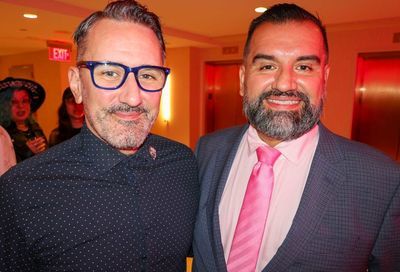Sharing Trans Tales
Transgender activist offers local screening of Latino-trans documentary that transcends borders
It’s not just a documentary film.
That’s the message that resonated for local transgender activist Ruby Corado, executive director of the local LGBT Latino group Latin@s en Accione, after watching the film Translatina.

Corado
There has been little promotion of Translatina, produced out of Peru, filmed in a number of Latin American countries, and illustrating the struggles of transgender people in those countries.
Corado is hoping to change that because she says the film hits close to home and in many ways mirrors the same issues that transgender people face in D.C.
”I want people in D.C. to see that although we have not had the opportunity to document our history to this degree in the nation’s capital, this mirrors our everyday experiences as transgender people,” Corado says. ”It talks about violence, discrimination and the lack of employment.”
Corado is making Translatina available to D.C. viewers on Thursday, June 10, by presenting a screening of the 93-minute film during Latin@s en Accione’s open-house event from 5 to 9 p.m. at The Center, the metro area’s LGBT community center.
”The reason I’m showing it is because this is the first time that international health agencies have looked at the transgender issue in terms of public health,” Corado says, referring to the Pan American Health Organization’s (PAHO) dissemination of the film.
PAHO is an international public health agency working to ”improve health and living standards of the countries of the Americas.” It also serves as the Regional Office for the Americas of the World Health Organization (WHO).
”As of today, there has been nothing of this magnitude,” Corado adds. “These agencies, they focus on other things. But when they decided they wanted to distribute this film, it was outstanding. Plus it was a project that has been in the works for the past three years and they finally have this documentary.”
Corado says the film, which is in Spanish — subtitled in various languages, including English — can be used globally as an educational tool.
”This is not just about entertainment. This addresses a lot topics,” she says.
”I really haven’t seen any [other] film that puts an emphasis on underground health practices and how that plays a role on the health of individuals. There are films about violence, but they don’t talk about silicon use. There are films about silicon use, but they don’t talk about sex work. There are films about sex work, but they really don’t focus on violence.
”This film really touches on everything,” Corado says, adding that at times, it’s difficult to watch.
”What I’m hoping to see after I show the film is that there is an emphasis put on the issues that are presented in the documentary.”
To attend Latin@s en Accione’s open house, running 5 to 9 p.m., Friday, June 10, at The Center, 1810 14th St. NW, RSVP to .
Support Metro Weekly’s Journalism
These are challenging times for news organizations. And yet it’s crucial we stay active and provide vital resources and information to both our local readers and the world. So won’t you please take a moment and consider supporting Metro Weekly with a membership? For as little as $5 a month, you can help ensure Metro Weekly magazine and MetroWeekly.com remain free, viable resources as we provide the best, most diverse, culturally-resonant LGBTQ coverage in both the D.C. region and around the world. Memberships come with exclusive perks and discounts, your own personal digital delivery of each week’s magazine (and an archive), access to our Member's Lounge when it launches this fall, and exclusive members-only items like Metro Weekly Membership Mugs and Tote Bags! Check out all our membership levels here and please join us today!




















